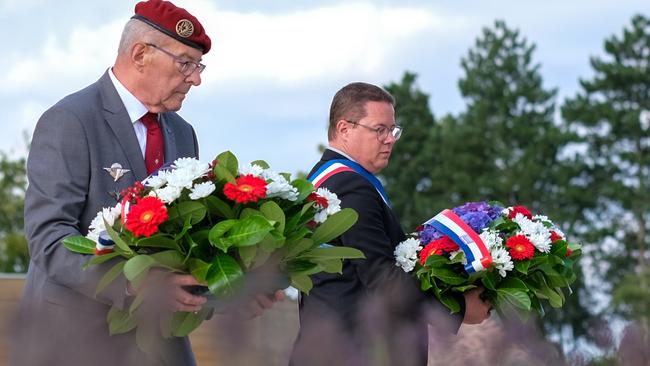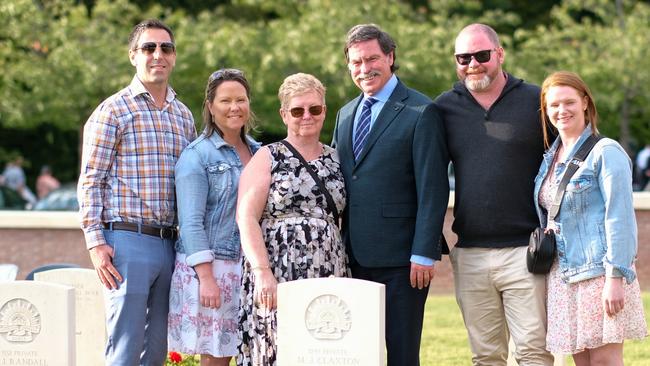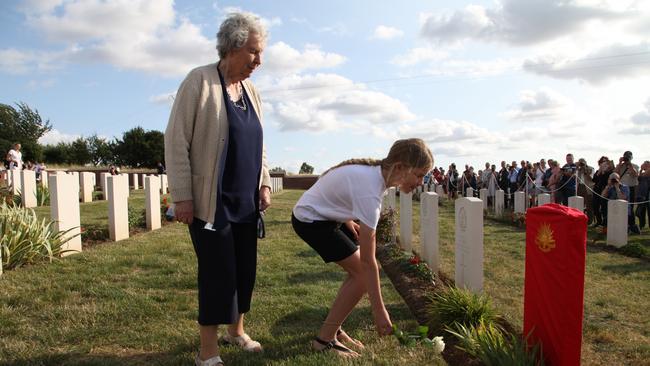No longer unknown: Australian World War I Diggers find last resting place in Fromelles
Seven formerly unknown Australians have been rededicated in a moving ceremony in Fromelles and attended by Australian, British and French dignitaries.

At the Pheasant Wood cemetery in Fromelles, the Claxton family from Melbourne gather around the headstone of their great uncle Maurice Claxton who was one of the 5,533 Australian casualties who died on the dreadful day of the Great War, July 19, 1916.
Private Claxton was just one casualty of The Battle of Fromelles, one of first and bloodiest days in Australia’s military history.
But on this balmy French evening on Wednesday, Private Claxton’s headstone was unveiled and he was re-dedicated, alongside another six formerly unknown Australians in a moving ceremony watched by several hundred people and attended by Australian, British and French dignitaries.

The Australian ambassador to France Gillian Bird said in an address that the tragedy of the Battle of Fromelles was compounded “because the final fate of so many of those young men remained unknown“. She added: “Their families never knew what happened to them; they didn’t know how they died or where they were laid to rest.”
Two hundred and fifty bodies of mainly Australian soldiers had been found in a nearby unmarked mass grave in 2008, and over the past few years 173 of those have been identified and reburied at Pheasant Wood.
On this the 107th anniversary of their deaths, Private Maurice James Claxton, Sergeant Oscar Eric Baumann, Corporal William John Stephen, Private Richard James McGuarr, Private Alexander Russell Robert Page, Private Walter Allen Grace and Private Edwin Charles Gray are no longer unknown soldiers.

Great nephew Robert Claxton placed a slouch hat amid some white roses and a small Australian flag at the foot of Private Claxton’s grave. Another relative Troy Marinier from Melbourne observed a moment of silent reflection.
The family had known of Private Claxton, but not what had become of him. His brother Theodore, who was also in the 32nd battalion had managed to send a postcard to the family advising them he was a prisoner of war. In a letter home, Theodore said he didn’t know where Maurice got to even though “we were together until we made the charge, when we got separated.”
For the Page family, this was a moment their family had waited generations to happen: their grandmother Grace Page had even sold her house to get to France to try and look for her missing son Alexander, hoping that somehow he was wandering the battlefields having lost his memory.
“Both Grace and Alex’s four sisters died not knowing where he was so that’s why we are here, we came in his memory,’’ said Alex’s great niece Diane Fletcher.

The Australian Army’s Unrecovered War Casualties unit with the support of the Fromelles Association of Australia, had even contacted a distant cousin Jean Page, from Essex, through a family tree website, in order to obtain male DNA from her nephew John Page to confirm Private Page’s identity.
“We are so happy he is found, we grew up knowing he was missing; he had another brother James who was killed as well,’’ said Diane. However for Jean, she has now discovered New Australian relatives and had known nothing of Private Page until 18 months ago.
“I have become really fond of Alexander,’’ she said. “ I have been learning all about him, he was a milkman and my dad was a milkman, so today is an emotional day.’’
Alan Cooper from Army headquarters said a team of genealogists trace many generations to find DNA donors. He said the army considered this to a “battlefield clearance task”.
“It is very humbling to see the families here,’’ he said, adding they are very honoured that their relatives fought in the war and have been identified.
He said there were hundreds of Australian investigations ongoing to try and identify unknown soldiers across Europe.




To join the conversation, please log in. Don't have an account? Register
Join the conversation, you are commenting as Logout